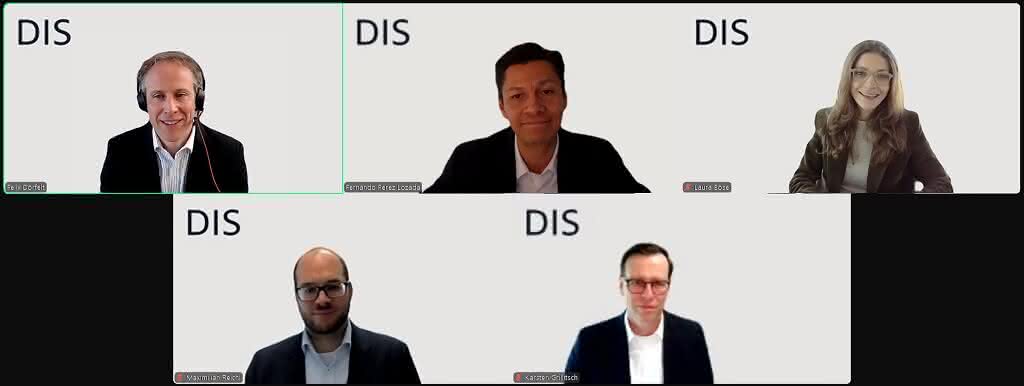
The Lunch DIScussions session on 15 May 2025 explored the evolution of Third-Party Litigation Funding (TPLF) in Germany – an increasingly influential tool in dispute resolution.
Moderated by Fernando Pérez Lozada (Loopa Litigation Finance), the session brought together three experts with distinct perspectives: Felix Dörfelt (Addleshaw Goddard), Laura Böse (Watson Farley & Williams), and Maximilian Reichl (Oppenhoff).

In his opening remarks, Karsten Grillitsch (DIS) addressed recent public criticism of litigation funding, noting that TPLF has the “potential to enhance access to justice” and already “operates within a framework accepted by the legislature.” Against this backdrop, the panel examined how TPLF is transforming legal practice – raising questions not just of funding mechanics, but of legitimacy, transparency, and regulation.
Evolving Models, Diverging Challenges
TPLF now plays a strategic role in both mass claims and bespoke commercial disputes. As Reichl noted, “In mass claims, funding is mostly about convenience. In individual high-value disputes, it’s about managing existential risk.” Funders expect claimants to share in the financial commitment – bearing upfront costs and presenting legally and economically sound cases. But the due diligence process funders require “can provide valuable cause for thought for the legal team working on the case.”
Two primary funding models were discussed: the full-financing approach and “monetization,” where a portion of the claim is advanced upfront. According to Pérez Lozada, this latter model offers liquidity “similar to factoring,” allowing businesses to pursue claims without diverting capital from operations.
Regulation: Necessary or Overreach?
While Germany permits litigation funding, it lacks a coherent regulatory framework. The panel discussed risks associated with this vacuum, especially in the context of the EU’s collective redress regime. Dörfelt was critical of the 10% cap on funder returns proposed in such actions: “It effectively killed their viability.” He also cautioned against attempts to classify funders as unsecured creditors, warning this would “push funding out of Europe altogether.”
Dörfelt argued that courts’ inconsistent treatment of funding agreements – as partnerships, sui generis contracts, or quasi-insurance – creates legal uncertainty. Nonetheless, he believes current market practices offer sufficient safeguards, particularly in arbitration, where funders often disclose their involvement to avoid conflicts that could jeopardize awards.
The Global Perspective
Böse expanded the discussion to international arbitration, noting that funders are becoming more sophisticated – financing ISDS claims, monetizing awards, and managing enforcement. “What makes investment arbitration attractive is also what makes it volatile – costs, enforcement, and the political nature of awards.” She emphasized the need for balanced transparency rules, such as those found in the ICSID framework: “The goal should not be full transparency of commercial contracts, but rather basic transparency to ensure fairness and to guarantee a neutral forum.”
Böse also pointed to inconsistencies among arbitral institutions regarding disclosure obligations, which can expose parties to reputational and procedural risks.
A Shared Responsibility
While the panel did not reach a single conclusion, it shared a sense of urgency. Litigation funding is here to stay, but its future hinges on thoughtful regulation and informed use. As Dörfelt concluded, “Economic viability must remain at the center of the regulatory conversation.” Böse stressed that “well-structured funding” must evolve with arbitration practice, while Reichl urged clients to fully understand “how it works, what it costs, and what it enables.” For Pérez Lozada, the focus must now shift: “This isn’t a debate about whether funding belongs – it already does. It’s about how we design a system that makes room for fairness, flexibility and trust.”
Looking Ahead
TPLF is no longer peripheral, it is rather reshaping access to justice and the economics of litigation in Germany and across Europe. As regulatory debates continue, the challenge is clear: to build a system that balances innovation with integrity. As these Lunch DIScussions showed, the time to shape that system is now.
Karsten Grillitsch